by Iñaki Galdos
José Antonio Agirre (1904-1960) was the first Lehendakari (President of the Basque Government) but also a well respected and admired politician, whose influence transcended the nationalist movement which he was leading at that time. His character has become a symbol, even a myth in the memory of a large part of Basque society, but despite this and while there are many books that dealt with this matter, a political biography on him done with scientific rigor was missing. Four prestigious professors, experts on the history of Basque Nationalism, have been responsible for such work, which ended last June with the presentation in Bilbao of an outstanding book. Basque Tribune has talked extensively with the coordinator of the project, Ludger Mees (Essen, Germany, 1957) with the objective of sharing one of the great Basque figures of the 20th century with our readers.
Basque Tribune.- To begin, I would like you to briefly introduce José Antonio Agirre to our Basque Tribune readers, who are typically citizens of the world very interested in Basque matters, but who do not have in-depth knowledge of its history.
Ludger Mees.- José Antonio Agirre was a leader of the Basque nationalist movement in its second generation. He was born a year after the politician and founder of Basque Nationalism, Sabino Arana Goiri, died. He was born in 1904 but already in a nationalist family so he somehow inherited nationalist thinking, as well as the Catholic faith of his family. Summarizing and analyzing his entire political career, it is no doubt that Agirre was the most important, most popular, most influential Basque politician of the 20th century. There were also other very influential politicians like the Socialist Indalecio Prieto, but the unique characteristic of Agirre is that his popularity went beyond the limits of the nationalist collective because he gained the respect, even the support of many Basques and non-Basques, both nationalists and non-nationalists.
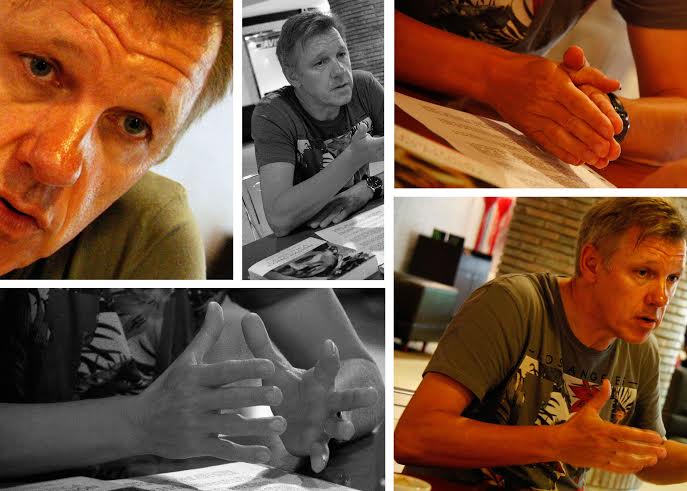
Professor Ludger Mees at the interview with Basque Tribune. Aitor Azurki
As you said, José Antonio Agirre, in addition to being a political leader was also a fervent believer that led various Catholic movements in his younger days. Was it always easy to combine both of these aspects of his way of thinking?
Agirre was very religious, even attending daily mass and confession during a period of his life. But he was a believer who lived his Catholic faith devoutly, but he didn´t show it off like other contemporary leaders of his. But in response to the question you asked me, obviously, especially during the Civil War he had certain problems because the higher Catholic hierarchy in Spain was actively in favor of the rebels, the Franco supporters. But Agirre said on one occasion that if he took part in favor of the Second Spanish Republic it was not despite his Catholic faith, but because of his Catholic faith. It should not be forgotten that for many Catholic people in the center or right wing politically, the Republic was a threat to their faith, but for Agirre it was an obligation to defend democracy against the rebels because this was the only way the Christian values which he had would be defended.
You speak of the Civil War, but, although we go forward in time, he developed a huge disillusion with the Vatican while he was in exile years later.
Indeed, because although both he and his party maintained direct ties with the Vatican, they could not avoid the Concordat of 1953 between the Vatican and Spain, who already assumed the formal recognition by Catholic leaders of the Franco regime. He expressed his disappointment never publicly but in some private letter.
Continuing with the presentation of this person, between the two so-called historical Basque nationalist souls (the radical and the moderate) and tilting strategies which you describe in other essays on Basque Nationalism, José Antonio Agirre is characterized typically as a possibilist and pragmatic moderate. Is this a too simplistic analysis?
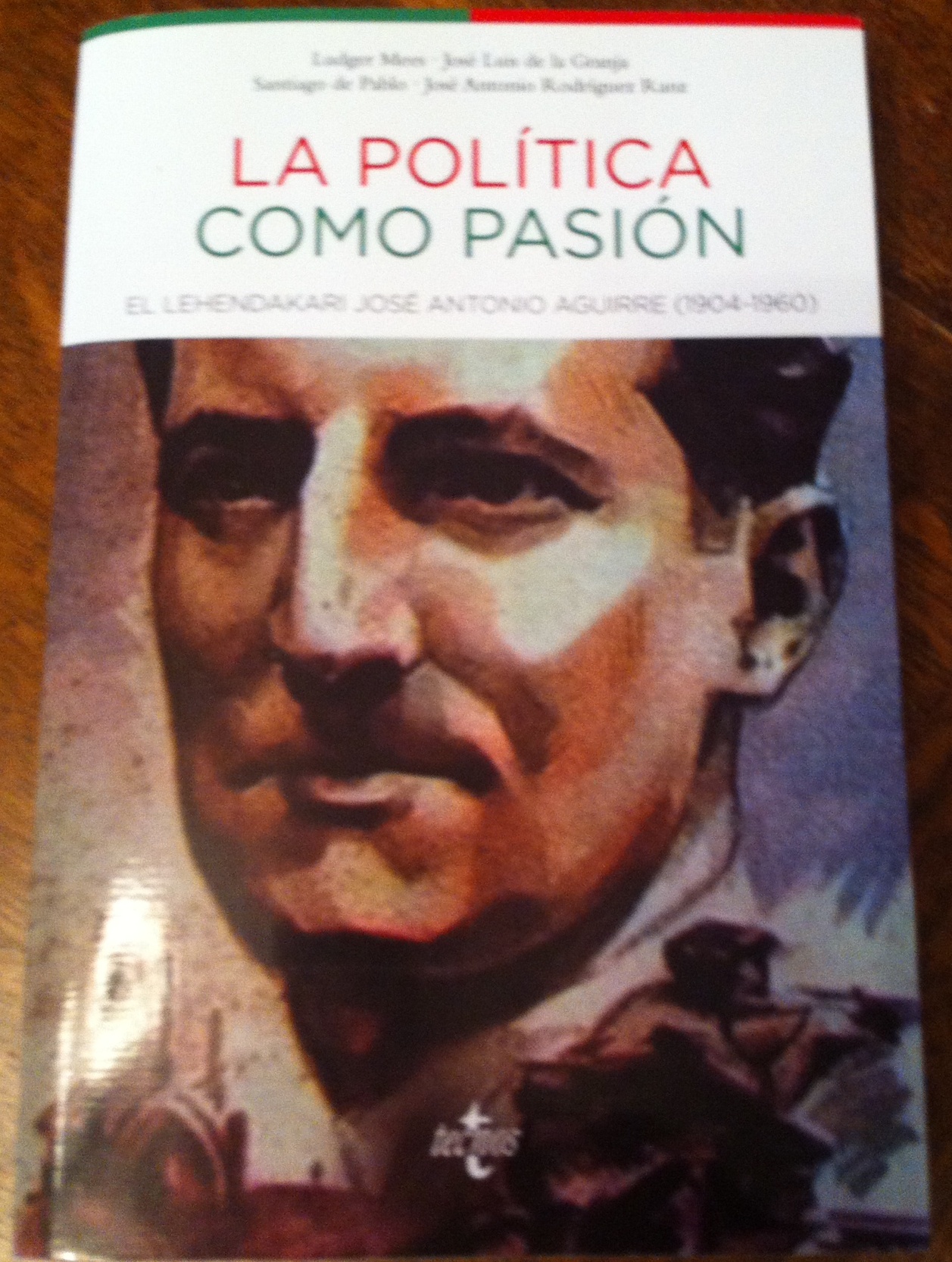
Cover of the recently published biography of Lehendakari Agirre. Photo: Basque Tribune
If we stopped right there, I do believe that it would be a simplistic analysis, because it would not take into account the full career of Agirre. When we came up with the simile of a “pendulum” as a way of analyzing the history of the Basque Nationalist Party (PNV) that Agirre belonged to, one of the issues that we provide and then many people have forgotten is that the pendulum between radicalism and more moderate attitudes can work even in the interior of certain individuals. We see leaders whose lives and political careers reflect such swings. This is very noticeable for example with Manuel Irujo, another of the great leaders in the history of Basque Nationalism, but it is also true to some extent with Agirre, whose attitude in his first exile was radical, as we will see later. But in short: we find ourselves reflecting on a politician always seeking agreements with a moderate attitude, but also with more radical phases.
Reading his biography, one will realize that in a very short time, especially since the advent of the second Spanish Republic (April 1931) the outbreak was meteoric, leading a broad-based movement in favor of the Basque Statute of Autonomy as Mayor of Getxo (Province of Biscay) and as a Congressman in Madrid. The reader perceives two things: that his party delegated the entire strategy and action to him; and that he achieved that the call for autonomy would transcend the Nationalist claim, reaching far beyond Nationalist boundaries.
You can clearly say that during the second Spanish Republic, which is when Agirre gets involved in politics, Agirre is a shooting star of Basque politics. A star that breaks into the firmament of Basque politics (and in Spain as well) in a very short amount of time, and still very young. Sometimes I have compared him to Manuel Azaña, since Azaña is to Spain what Agirre is to Basque politics. This being so, in the party they realized that Agirre was very charismatic with people: he was a great speaker at rallies, even maintaining his athletic stature from his stint as an Athletic de Bilbao player. There were even certain testimonies from which we can deduce that he had a certain sex appeal especially for women, who with the Republic are finally able to vote.
Therefore, the party did not hesitate to take advantage of that impact in public sectors. And indeed, being the leader of the movement of mayors in favor of the Statute of Autonomy, he managed to forge a movement beyond Basque Nationalism, where parties such as the Socialists or the Republicans converged, even some Carlists, though, as it is known, Agirre had to break with the latter because he realized that for the Carlists, the claim for the Statute was not worth it as an instrument of self-government for the Basques, but as a tool for going against the Second Spanish Republic.

April 16, 1933. José Antonio Agirre in San Sebastián at the Aberri Eguna celebration (Basque patriotic celebration day). Photo: Pascual Marín (Wikimedia Commons)
That autonomist movement of the Second Republic had two failed attempts prior to its achievement. In the first, nationalism allied itself with the traditionalist right wing and in the second attempt, with the left wing. This is not the place to expand on the reasons for the failures, but the Basque people will always have questions. For example: Was the first attempt of 1931 that close to achieving a Statute of Autonomy of four provinces, including Navarre?
No, the Navarre situation is a legend that still exists, but serious modern historiography has already dismantled it. In the first place, because the so-called Statute of Estella (which received the name from the town of Estella in Navarre) at no time could be approved by those who were then in the Government of Spain, the left wing. Here we will not delve into the reasons but it´s obvious. And secondly, it should not be forgotten that the Basque environment favoring autonomy in the Navarre society was still weak. But new legal obstacles also emerged since the traditionalist right or conservatives, dominating after the failure of the Statute of Estella in Navarre, had already made the decision that any attempt for a Basque statute to include Navarre, should be endorsed separately by Navarre institutions as well as its citizens, requiring a two-thirds majority. And that was unimaginable to achieve. It is therefore a matter that invites us to reflect on a certain political blindness of the nationalists at that time, thinking that it could continue against such opposition.
Another question floating in relation to autonomist movements: On the second attempt, already without Navarre, was the province of Araba about to be willfully excluded from the Basque Autonomy?
Yes, there was that possibility, but it was not as extreme as in Navarre. It was due to a reading that the traditionalist conservatives published regarding the results of the Statue referendum. But on the one hand, taking into account the increasing implementation of nationalism in the province and, on the other, the increased involvement of the left wing led by Indalecio Prieto in favor of the Statute of Autonomy, it was a fear that faded, although it delayed its final approval.
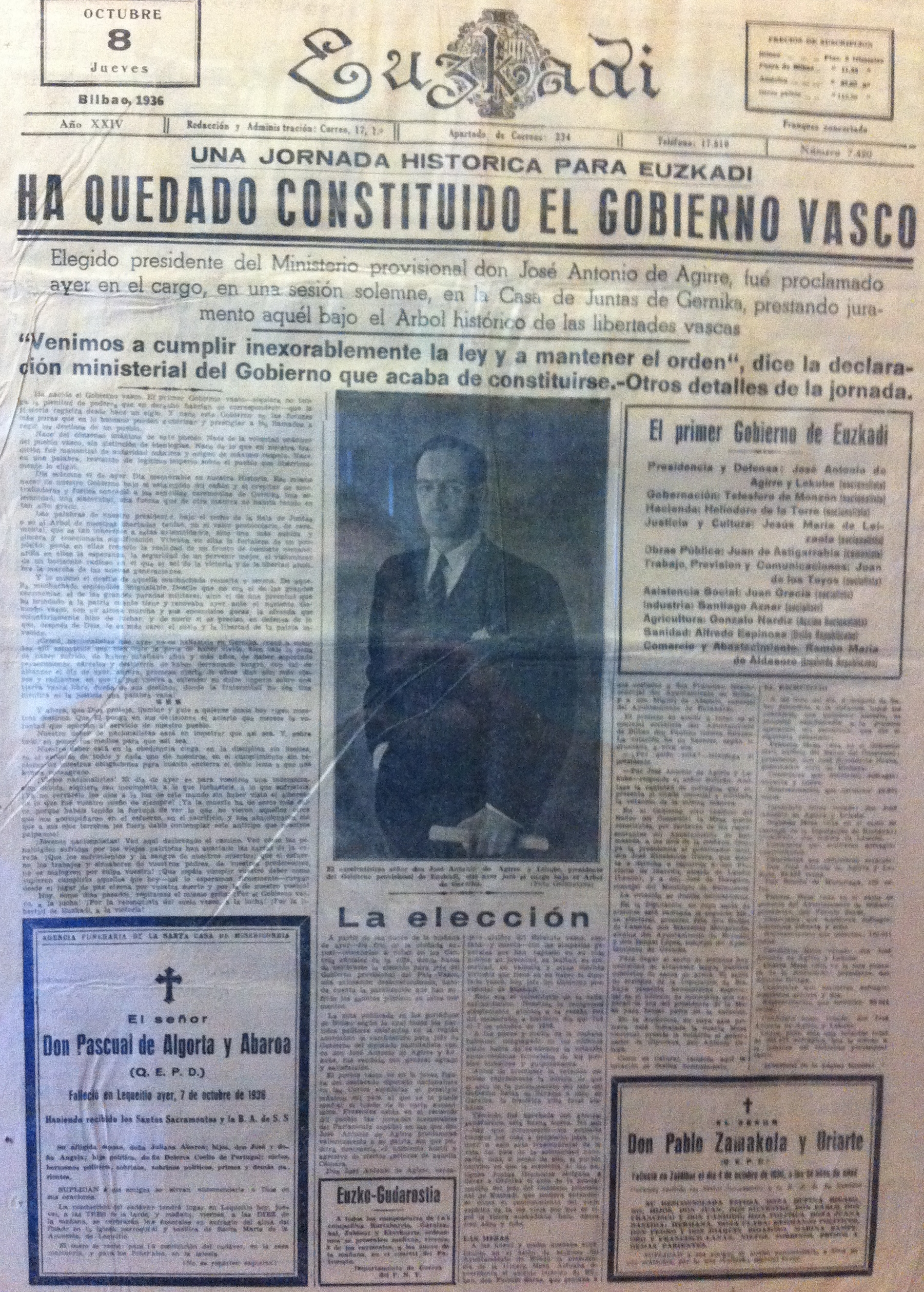
Cover of Euzkadi newspaper on October 8, 1936, showing the Constitution of the first Basque Government and the election of Agirre as President, which took place the day before in Gernika. Basque Tribune
Both the approval of the first Basque Statute of Autonomy and the election of Agirre as President of the constituted Basque Government occurred after the Spanish Civil War began and in full onslaught by the pro-Franco side. Before beginning to talk about the war itself, I’m going to pose a previous question. It is well known that some voices of PNV hesitated on whether to enter into a war which they considered alien and others would have preferred to support the coup d’état. What weight did Congressman Agirre carry in deciding to support the legitimate Republican government then?
It is true, and many testimonies indicate it as such, that the coup d’état and the start of the war were unexpected for PNV and put the party in a difficult situation, because on the one hand they disagreed with the Government of the Republic yet on issues such as the Catholic faith they were closer to the coup leaders. But they did not know exactly what was going on and therefore were slow to react. They thought that perhaps it was a mere attempt and resembled that of Sanjurjo of 1932 (which was aborted quickly) and therefore would not require great involvement.
There were sectors like Manuel Irujo´s which clearly pushed for a position in favor of the Second Spanish Republic. But it was the famous night of July 18th to the 19th of 1936, when the direction of PNV in Bilbao decided to take sides on the Second Spanish Republic and the decision came out in the daily Euzkadi in a well-known statement. We do not know for certain the influence that Agirre had in this regard, because there are no minutes from the meeting. It is not even known for sure if he attended the meeting, although we are inclined to think so. But it is clear that taking into account the leadership Agirre had within nationalism, his stance would carry substantial weight.
But it is interesting that during those days, in the weeks after the coup, Agirre disappeared from the public scene. The press hardly mentioned him except anecdotes without political significance such as attending a funeral… However all this began to change when little by little, at the end of September, the possibility of getting the Statute from the hand of the leftists appeared. It was then when Agirre reappeared leaving his ostracism from weeks prior becoming again what he had been before, the great leader.
Keep in mind, as well, that maybe as a consequence of his endless optimism a few days before the coup, being in Madrid, he published an article predicting that the Statute was near. While in Madrid he did not capture what was actually happening and he believed that it was almost certain that by the end of summer there would be a Statute of Autonomy.
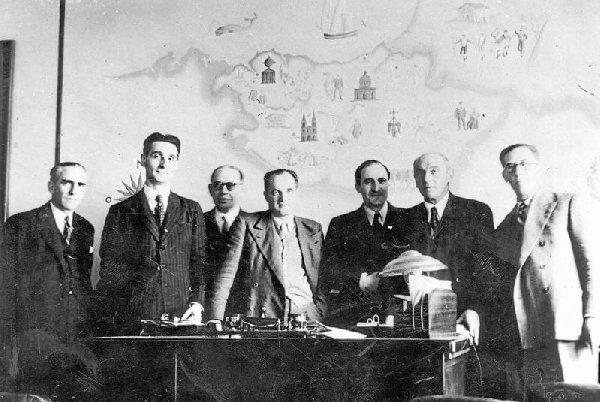
Lehendakari Agirre with members of his government at the headquarters of the Basque Government in exile on Avenue Marceau in Paris. Photo: María Goñi-Doroteo Ziaurriz Archive
Once at war, we find a Basque Government with much of its territory occupied by the pro-coup side, but very active, with an organization and orderliness that are somewhat surprising in a situation of war. The expression Basque Oasis is sometimes used to talk about it. In addition, de-facto powers were assumed such as coining money that transcended what the Statute of Autonomy granted.
I think that Basque Oasis is an expression that sums up the situation quite well, because we must not forget that while in a part of the rest of the State there was a flare-up of social revolution, attacks against convents and churches, clergy… this to some extent did not occur in the territory of the Basque Country, which was still in the hands of the Basque Government. PNV was still a party of order whose priority was to maintain a high level of normalcy in the context of civil war, respecting among other things religious practices.
On the other hand, indeed, the Basque Government and Agirre took advantage of the situation to create a territory that controlled not only autonomy but almost a Basque State: the Basque Government who was in control, assembled its own army (although it had to coordinate it with the Spanish Republican Army) and also created retirement plans and many other things. The Statute of Autonomy of 1936 is a very brief text, which left many things undecided and Agirre took advantage of the situation to create almost a State during those months.
However, that experience of government in Basque territory could not last long, due to Franco’s pressure. Before his transfer to Barcelona until the almost definitive defeat of the Spanish Republican side, a historical situation was produced that still arouses controversy. I am referring to the Basque-Italian agreement of August of 1937, called the Pact of Santoña. We would like to know your opinion about both the agreement itself, and the role Agirre played in it.
As we demonstrated in the book with many sources, Agirre remained apart from all the negotiations which led to the Pact of Santoña. Surely he did this deliberately, but he also did it because main voices on this issue were the leaders of the party, specifically Juan Ajuriagerra, who through the priest Alberto Onaindia came into contact with the Italians to explore chances for agreement. Therefore, it is true that Agirre stayed on the sidelines, untainted by controversy and could once again become the great leader he already had been before.
In terms of the Pact itself we can say several things. On one hand it was quite a coherent decision of nationalist ideology, in the sense of saying “Here we are working basically in favor of a free Basque Country, therefore once our territory has fallen it´s not worth it to continue.” In other words, an orthodox argument of the majority of PNV at that time. But on the other hand, it would be a betrayal to the Second Spanish Republic to which they were allies. The war was not over yet and a pseudo-surrender was made.
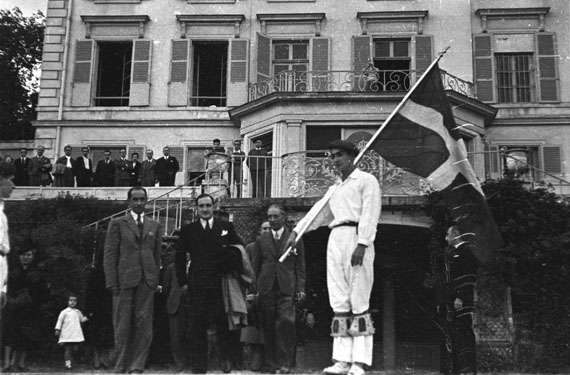
October 16, 1938. Agirre welcomes the Catalan President Lluís Companys at the Belloy Palace (Saint Germain-en-Laye, France). Photo: Jesús Elosegui Irazusta
It could be understood from a humanitarian point of view in the sense of saving lives, it is true, but it is also true that, from the most distant and critical point of view, it very powerfully calls to attention the gullible belief that the nationalists in those circumstances could trust what the Italians were about to agree on. What later occurred was one of the possibilities, showing that trusting the word of the Italians meant a notable lack of realism.
So we are now in exile (1939) and it is in the first of those years perhaps, as you shared with us at the beginning of the interview, when we find the most radical Agirre, in his ideology, I´m not sure if this is the right way to put it but the more anti-Spanish Agirre…
Yes, it certainly is a facet that is less known in the biography of our subject here, who stands out a little, as I said earlier, with the idea of a man always pragmatic and moderate. Now that the Second Spanish Republic had fallen, when nothing much was left, PNV and all of its leaders without exception opted for a rupture with the Second Republic in exile, and cancelled all commitments they had planned together, to create a policy they truly called national, with no ties of any kind. Then, is when the most anti-Spanish Agirre emerged. There is a famous quote that appears on one of the protocols of the meetings held since April 1939 in Meudon, near Paris, in which the Lehendakari said, “This is about the Basque Country against Spain”, which coming from Agirre´s mouth sounded strange if you think only about the more moderate Agirre.
It is a phase in which they try to overpower the Basque Socialist colleagues in the Government, hoping that they would break their natural links with the Spanish Socialists. However they were faced with stiff opposition from the Socialist leader Indalecio Prieto. Agirre continued along that phase for several years, but when he realized that this strategy was taking his Government to the verge of a breaking point, because Prieto had threatened to withdraw his representatives therein, is when he began to reconsider his position and abandon this radical nationalism and the hegemonistic pretensions.
But without a doubt one of the circumstances that marks the evolution of the figure of Lehendakari Agirre the most was his particular odyssey in the middle of World War II. This odyssey began when he was surprised by the German invasion of Belgium, while he was on a visit with his family in that country.
It is a fascinating odyssey from the present day point of view, because it has all the ingredients of a real thriller. Pleased about having reached an agreement with the Socialists, he embarked on a journey to Belgium with his wife and two children he had at that time, to see relatives they had not seen in a long time. Along with other Basques, he was surprised by the Nazi invasion of Belgium. As described in the book he wrote about the issue, as well as in his diary, he was unable to return to Paris and made an important decision.
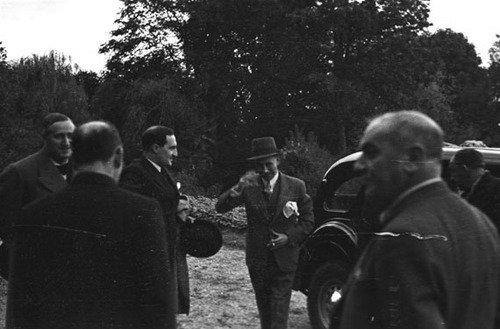
October 16, 1938. Agirre welcomes the Catalan President Lluís Companys at the Belloy Palace (Saint Germain-en-Laye, France). Photo: María Goñi-Doroteo Ziaurriz Archive
He knew that his life was in danger. We must not forget that in similar circumstances the Catalonian President, Companys, was captured by the Gestapo and turned over to Franco to be executed, as in the case of the Basque Socialist, Zugazagoitia. He thought that the safest place for him to be would be where he was least expected to be, right in the lion´s mouth. This is why he decided to go to Berlin, with a changed look and identity of a Panamanian citizen. He lived 15 months in this manner in secrecy. I am not going to enter into details on that stay, although there are many and they are amazing, but in the end, above all thanks to the huge help of the Basque-Philippine patron Manuel de Ynchausti (who was at the time in New York and very well connected with the Roosevelt Government) Agirre managed to get out of Berlin, reunite with his family and embark for Brazil through Sweden.
To end this chapter of his life, it should be noted that there are still writers, mostly linked to the Spanish right wing who seriously argue that Agirre went to Berlin to negotiate Basque independence. They have no sources with rigor, but they still write it.
From this point, first in New York and then in Paris, Agirre displays a fervent political and diplomatic activity that deserves to be reviewed. I’d like to point out first of all his boundless optimism to think that, with the fall of Hitler and Mussolini, the next one would be Franco. Everything seemed imminent. He took a long time to realize that such circumstances would not occur and that the new world order, the Cold War, the armor against communism were elements that played against the plans which the Basque exile headed by Agirre had.
Undoubtedly they are points that must be highlighted. Since the last years of World War II, from its comeback after that odyssey and settling in the United States, also as Professor of Columbia University, Agirre was very active, participating in uncountable forums, coming and going continuously from the U.S. State Department, rubbing elbows with very important people such as Vice President Henry Wallace… in short, he did not sit still for a moment and tried to pull as many strings as he could.
Indeed, logic led one to think that if Hitler and Mussolini fell, the next to fall was going to be his ally Franco, although he had officially remained neutral in the war. It was not a utopian thought. But to sum up a bit, from the historiographical point of view it is strange to see how long it took Agirre to realize that with the Cold War, especially after 1947, conflict increased, things were changing and it was no longer so logical to expect help from the allies to bring about a change of regime in Spain.
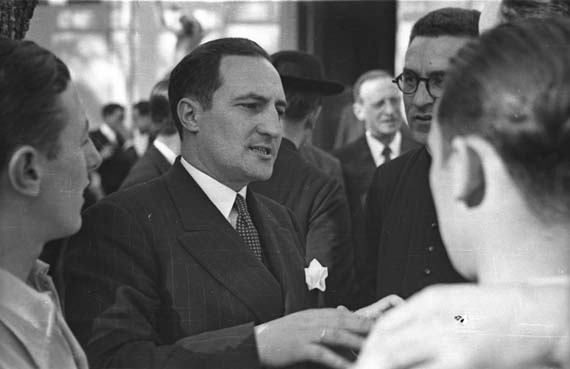
October 16, 1938. Agirre speaking the day of the reception of Catalan President Lluís Companys at the Belloy Palace (Saint Germain-en-Laye, France). Photo: Jesús Elosegui Irazusta. (Wikimedia Commons)
Even when Agirre returned to Paris in 1946, he continued to have his advisors in the United States, Antón Irala and Jesús Galíndez, who sent him three letters of 20 pages per week with very realistic, very raw analysis, warning that things were changing, plans were not going as expected. However, Agirre, with optimism that one of his aides described as childlike, marginalized such critical analysis and continued with his line of believing that his relations with relevant personalities would be decisive in finally getting help from the allies.
It was a time in which both the PNV and the Basque Government went to work for the information services of the USA and the United Kingdom, which still raises some controversy. What do you think about such collaboration?
We have to say two things. Firstly, during World War II, especially in regards to the collaboration of the Basque information services with the British Government, there are quite relevant cases proven of substantial Basque support for the British secret services. This is not the place to go into depth telling about this but it is something unquestionable. It is precisely because of the positive influence of the British that the U.S. Government also signed a protocol of cooperation with the Basques.
Previously there was a great debate between different departments of the Government of the United States wondering why they had to collaborate with “a regional Spanish group”, which is the literal expression used in the documents that we are familiar with. But I insist that it is thanks to the intervention of the British, who certified the effectiveness of the Basques, and therefore caused the American Government to give in.
Secondly, an aspect characteristic of the political activity of Agirre should be added. When he undertook any project, he did so giving it his all and from a position of strength. In this case, he knew that if he wanted to have the support of allies to overthrow Franco, it would be beneficial to be in a position of importance, trust and closeness to the U.S. Government. This is what Agirre was trying to accomplish through this collaboration. It was a strategy that did not bear fruit in the end but represented Agirre´s way of acting very well.
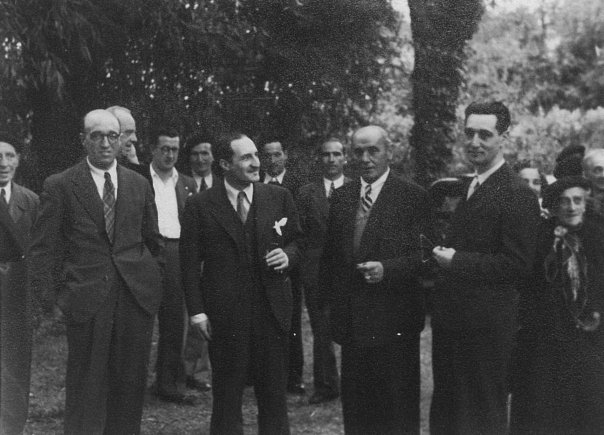
May 4, 1945. Lehendakari Agirre in the village of Kanbo (Northern Basque region), together with Basque exiles on the other side of the Pyrenees. Photo: María Goñi-Doroteo Ziaurriz Archive
Another aspect of that time that you pay close attention to in your book is the fact that the Basque Government and Agirre are presented as engine parts of a Spanish Republican government in exile, quite weakened and disoriented; with doubts and divisions. You even talk about the real possibility that Agirre could preside over that Government.
We find ourselves with the same attitude of Agirre that I detailed in the previous question. Through the relationships that he had he realized that in London, Paris or Washington, what happened in Bilbao didn’t matter as much as what happened in Madrid. In the strategic perspective that he had, he realized that any step that would be given toward freedom of the Basque Country would have to go through a pact with the Spanish Republican government in exile. Therefore, again he thought that if he could obtain a significant level of influence in the aforementioned Government, his word would weigh much more in the future.
It was due to this logic that he drove all that mediation between the different sectors of the Spanish exile, a task that seemed like an impossible mission. It was an anti-Franco Spanish exile basically divided into two fractions, one close to Juan Negrín and the other close to Indalecio Prieto. Agirre, who had good relations with both, began to mediate and managed to achieve in August of 1945 what months earlier seemed impossible: a Government in exile initially supported by all sectors. This intermediation, indeed, extended also to the Catalans, whose exile was also extremely divided.
On the other question, indeed, when the Government of Rodolfo Llopis failed, the President of the Republic, Diego Martínez Barrio, who had to choose the person who would put together a new Government, was convinced that José Antonio Agirre was the only person in the exile who got along well with everyone, the only one capable of uniting the entire exile in a strong Government. It was then that his name was cited as a candidate, a situation that would later be repeated in a new failure of the Republican government.
Agirre was shocked to receive the news, but from the first moment it was clear to him that his job was to lead the Basque Government and not the Spanish.
However, this involvement by Agirre in trying to give life to that Spanish Government in exile cost him, in the early 1950s, the first critical voices within Basque nationalism, which considered that there was an excess of focus on Spanish politics.
Yes, but it is interesting to note that those voices are slow to appear. In the first place they are mostly minority voices. The first is perhaps his most intimate childhood friend Telesforo Monzón, who resigns as Minister of the Basque Government in 1953, but in a “clandestine” manner, since such resignation is not released until three years later in the Basque World Congress.
He was the first voice that criticized the excessive participation in non-Basque politics and vindicated the true essence of Basque politics. Later Monzón would be closer to the world of ETA and the new left Basque nationalists becoming one of their icons. Anyway, this was a political and not personal breakdown. They remained friends and even at Agirre´s death, his coffin was at the Monzón house
But I insist that critical voices were definitely the minority at that time.
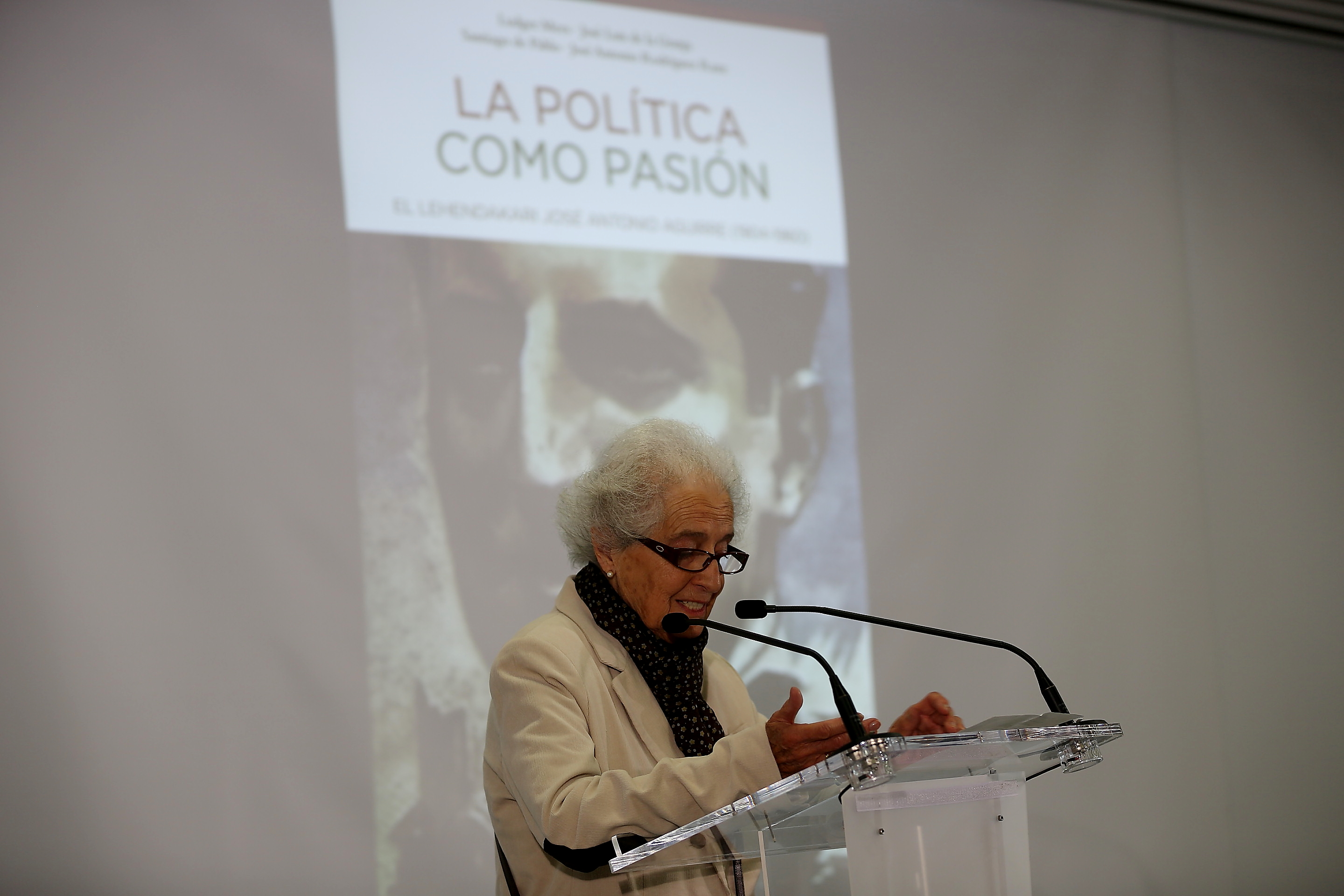
Aintzane Agirre, the day of the presentation of the political biography of her father, José Antonio Agirre in Bilbao. Photo: Maite Elorza
Agirre described all these movements with a pragmatic view of things. However such pragmatism sometimes seems puzzling. In a relatively short amount of time, almost without interruption, passed from a Basque isolationist posture complaining about the Spanish Government in exile to becoming practically its undercover leader; from not wanting to know anything about the emerging anti-Franco monarchists to trying to negotiate with them, then returning to his initial position; from facing with vehemence against the Spanish Socialist leader Indalecio Prieto to sharing in his strategies. Does his pragmatism explain it all?
Sometimes it is certainly disconcerting, but we would not understand it well if next to that pragmatism we have in mind another facet characteristic of Agirre: his unlimited activism. Agirre was a political thoroughbred who preferred to err before doing nothing.
The other day I read a quote from President Franklin D. Roosevelt, that describes the attitude of President Agirre very well, that panic of doing nothing, to not having a plan B: “It is common sense to take a method and try it. If it fails, admit it frankly and try another. But above all, try something.”
On the case of the monarchists you mentioned, it can also be disconcerting because Agirre was not monarchical, the type of Government he preferred was the Republic. But it was also a logical move. All this began when Agirre realized that the previous experiment, that of the Republican government in exile, was no longer working and had no future.
In addition, in 1946 the allies had published their famous Nota Tripartita in which they advocated a Government in Spain consisting of personalities, a liberal government, a Government of order, as an alternative to the Franco Government. That seemed to point to Don Juan, who was then more or less distanced from Franco’s Government.
In this context, we can understand that logic: “If the Republic does not work and as we couldn’t be sitting idle, we are in line with what the Socialist Prieto was trying to do with the monarchists, to see if together we could achieve the involvement of the allies.” It is an attitude quite consistent with his political and strategic thinking.
Something similar happens with his optimism, which you have already spoken about earlier. It is surely an indispensable quality of any great leader to have large doses of optimism, but in the case of Agirre his optimism often seemed overly naive and exaggerated. In this respect, I go back through three periods of his biography in which something similar takes place: successive negotiations for a Basque Statute of Autonomy of the 1930s, the Spanish Civil War and the years following the end of World War II. In all these situations, even when his colleagues warned him that it was a lost cause, he thought, or said that he thought, otherwise.
First, as historians we obviously have the advantage of knowing what happened next. But it seems puzzling to see how long it took Agirre to become aware of the changes, when such changes were not positive for him. Being a well-connected man, in constant dialogue with people making decisions, with well-informed advisors, he always maintained an optimistic point of view.
The question that should be brought up is: “Is this an external display with the intention of keeping the team he led alive by proving that something can be done? Is this artificial optimism or something that has to do with his personal nature?” In the book, we make it absolutely clear, because we have read thousands of documents, that this optimism is not artificial at all. In his private correspondence which was not intended to be published later, this optimism always shows. We therefore find a double aspect of optimism that on the one hand, lifts and inspires people but on the other, slows down capturing the surrounding reality that was far from positive much of the time.
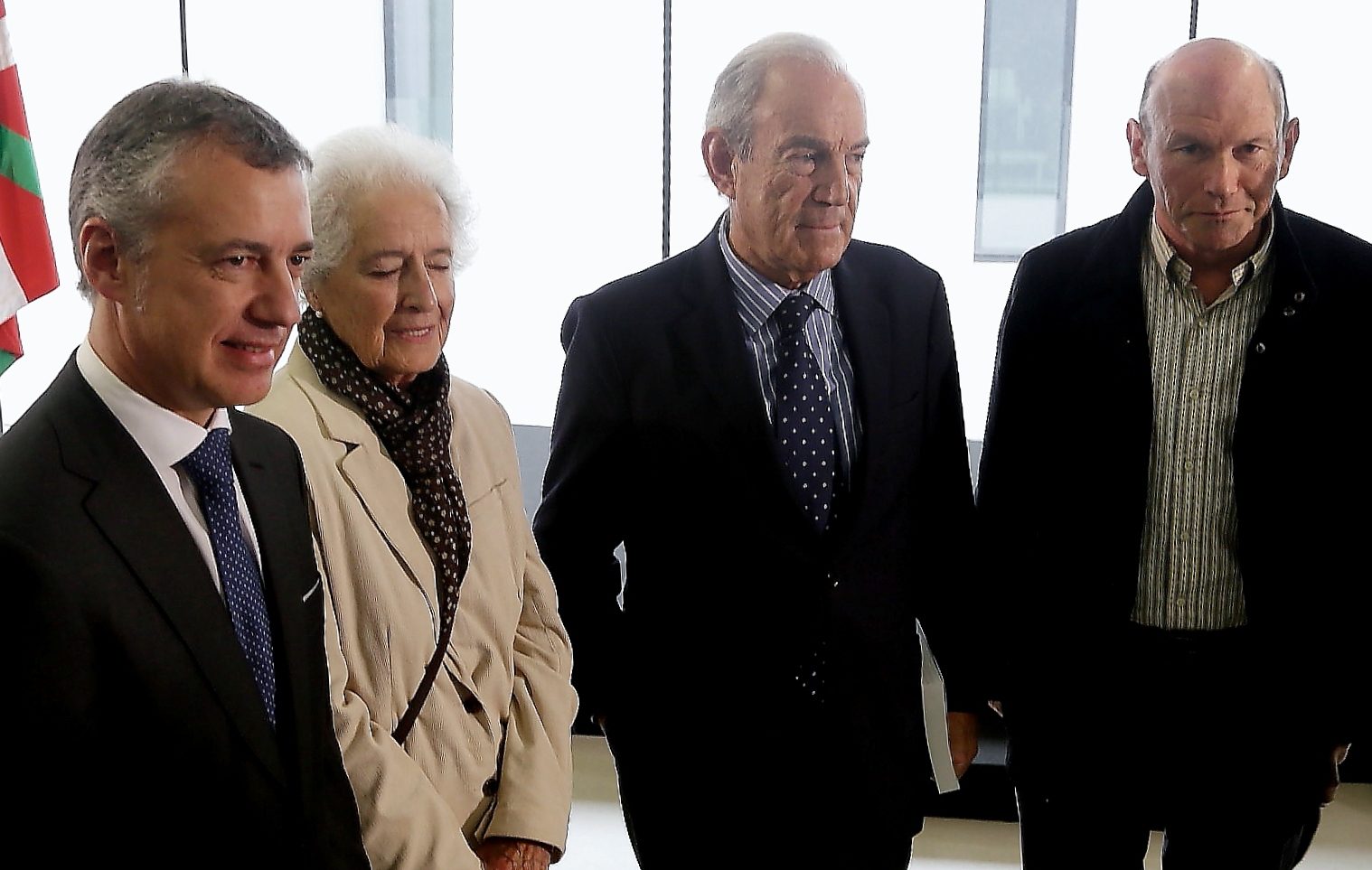
Three Lehendakaris, Iñigo Urkullu, Carlos Garaikoetxea and Juan José Ibarretxe along with Aintzane Agirre the day of the presentation of the biography. Photo: Maite Elorza
I’d like you to speak about Lehendakari Agirre´s Europeanism. You say that, after all the possibilities of an overthrow of Franco in the way Lehendakari Agirre had attempted failed, his last hopes for success were placed in the new Europe that was starting to be built.
Undoubtedly both Agirre and the PNV were always pro-European, at the time of the second Republic and even before.
Agirre writes at one point that for him Europe is “the greatest of hopes.” That is indeed the case because the rest of his hopes had failed. Agirre is a politician who except for his great success which was the conquest of the Statute, had met with failure on everything else, as we have reviewed. Franco was still stronger than ever.
However, Europe began to be built as a new unknown reality. And it was also a new Europe in which Agirre had very good relations and on the other hand a Europe that had excluded Franco. It was then when the belief that keeping Spain out of that new Europe would cause Spain to be emerged in movements of mobilization that would lead to the overthrow of the regime as a prelude Basque freedom.
What is clear is that Agirre, his Government and his party maintained close relations with important European political figures. What role did all of them play at that time?
To begin with, I must say that Agirre was not an ideologist on Europe. Of all his writings, in very few he spoke of the construction of Europe. Therefore I do not like to speak about the Agirre Doctrine when it comes to Europe. There were other nationalist leaders like Javier Landaburu focusing more than Agirre on Europe. What we have tried to rebuild in this facet of our protagonist is based mostly on internal reports and private correspondence. Therefore more than an ideologist, his commitment and involvement in Europe is strategic.
Agirre was convinced that his relationships and his influence with prominent personalities who were then involved in the construction of Europe such as Robert Schuman and Alcide De Gasperi would be beneficial. What´s more, they were people with ideological affinity all being Christian Democrats.
Another test that both Agirre and PNV were well positioned for among the builders of the new Europe was itself based in the Basque Government on Marceau Avenue in Paris, where the first meetings of the new Federation of European Christian-Democratic parties called Nouvelles Equipes Internationales were held, a Federation with which both Agirre and Landaburu were involved.
Anyway, it is possible that the premature death of Agirre would prevent a new frustration, since Franco was consolidating but also because the Europe of States that ended up being built was not the Europe of the regions and nations that he was calling for.
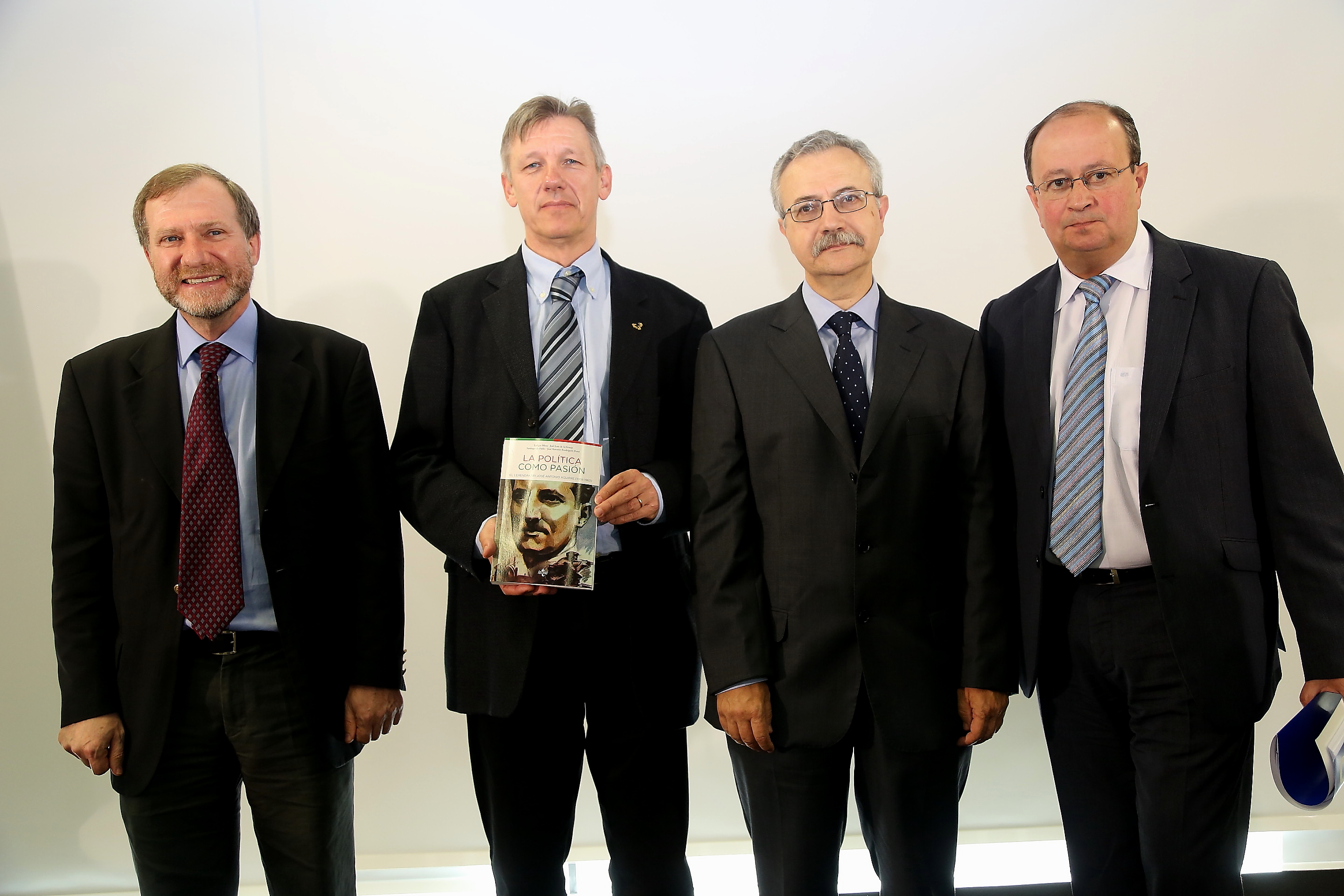
The four authors of the political biography of José Antonio Agirre: Pablo Santiago, Ludger Mees, José Luis de la Granja and José Antonio Rodríguez Ranz. Photo: Maite Elorza
Over the final years of Agirre’s life, news on the Basque political movement begin to emerge, both in the homeland as well as in exile: during the Basque World Congress held in Paris in 1956 by Agirre´s own leadership, there is a reference to the use of violence as a means to go against Franco and there is tough criticism against Agirre by Telesforo Monzón, whose resignation you spoke about before. Moreover, ETA, was created in 1959 with some of whose founders Agirre met with months earlier, when they were still nonconformists from the youth wing of PNV. Aware that I´m asking you to do an exercise in fiction in politics, how do think that our protagonist would have acted before these new milestones? Would there have been a different Basque history with a José Antonio Agirre preparing and managing their transition?
Some of these issues may indeed have a response based on sources, without going into too much risky hypothesis. Some others may not. For example, we know that before his death there is internal conflict within PNV, which in the end leads to the birth of ETA. Agirre met with several of their key players, and understood the growing concern especially inside the Basque Country, supporting them even sending propaganda material, an issue that cost him conflict within the party, especially with Juan Ajuriagerra. However, he told them to contribute to the anti-Franco struggle from within, without splitting the party. He clearly did not achieve that because ETA had begun.
ETA is a clandestine anti-Franco movement which after 1968 began to practice violence against people and that after the end of Franco’s regime continued with terrorist activities. I believe that because of everything we have said about this person’s Catholic faith and values of Christian humanism, Agirre would never have accepted violence against people as a method of political fighting. While this enters into the realm of speculation, I think that this can be deduced by analyzing the sources and documentation that we have.
On the other issue of what would have happened with an Agirre managing the Basque transition, this is a theme with no easy answer. My hypothesis is that what happened to Agirre during the last years of his life is what happens to many charismatic leaders, just as political sociology is frequently analyzed. A charismatic leader is something extraordinary: born out of crisis, with major projects, giving hope to his people. But it depends to a certain extent on whether he is able to carry out these projects and turn his promises into reality. Agirre spent the years in exile with failure upon failure and therefore his charisma is reduced down into somewhat of an ordinary condition. That means that the man who had been shielded to any kind of criticism, gradually ceases to have this almost mythical aura, and this symbolic figure becomes exposed to criticism. It is for this reason that I believe that the transition would not have been essentially different with him. That is my hypothesis.
The gradual loss of his charismatic impact during his final years is interrupted by his death, when Agirre maintained his status as a heroic leader, almost a symbol of the anti-Franco fight in the Basque Country. Criticisms end there and even the people of the newborn ETA praised him in their writings. It is at that moment when Agirre was reborn as a myth.
José Antonio Agirre President of a Government of three Basque provinces (Araba, Bizkaia and Gipuzkoa), Congressman in Madrid for Navarre and, finally, buried in the Northern Basque Country in Donibane Lohizune. Is this last gesture a demand for vindication for the unity of the Basque territories?
It surely is the case, because we need to know that he spent a good part of his political life in the Northern Basque region. Although the Basque Government headquarters was in Paris, Agirre traveled frequently to the Northern Basque region: his family is there. The Northern Basque region was ever present for Agirre although this was not reflected too heavily in his political activity.
It is also true that because of a series of circumstances he was Congressman for Navarre and, as we quote in the book, the person who was very close to Agirre both personally and politically was probably Manuel Irujo, the great nationalist leader from Navarre, with whom he had many clashes, but always managed to resolve. Therefore Agirre followed the issue about Navarre very closely his whole life.


Great interview, it gave me some more depth knowledge of Aguirre and inspiration.
Is the book going to be translated?